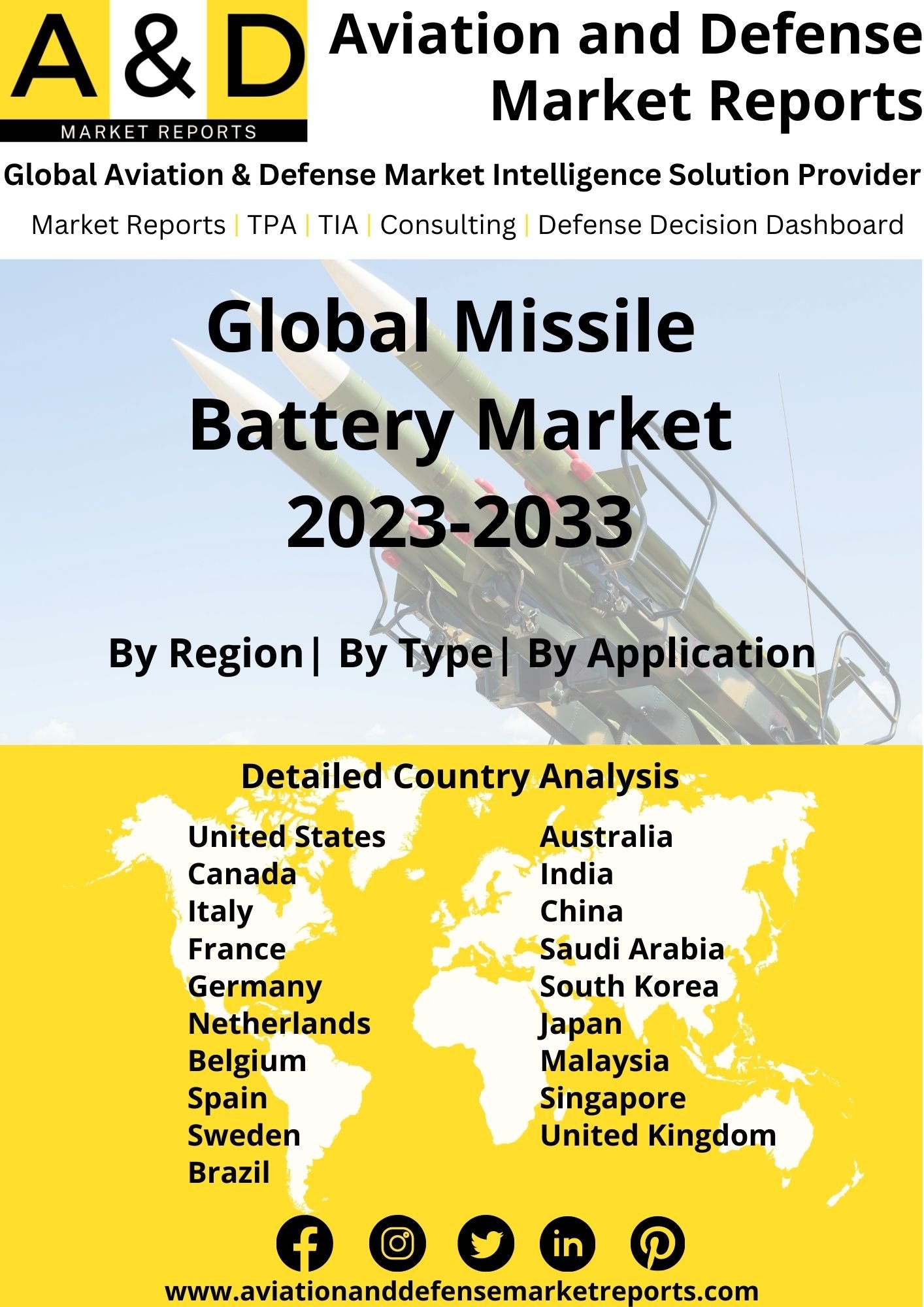Description
Missile Battery Market
Frequently Asked Questions of Missile Battery Market
Missile Defense Battery equips long and medium-range ballistic missiles with early warning, monitoring, and tracking. A missile battery is made up of a phased array radar, an engagement control station, computers, power generation equipment and eight to ten launchers, each of which carries two to four ready-to-fire missiles.
Surface to Air missile defense systems (SAM) are the most common type of air defense system in operation around the world. SAMs use radar data to guide them to their target. Modern air defense systems can detect and track numerous targets at the same time, as well as engage multiple targets at the same time.
The system detects threats with long-range radars and relays the information to a command vehicle for friend or foe identification. The data is then transmitted to the engagement radar, which aids in guiding the missile toward the target. Some missile defense systems may destroy objects that fly quite close to the ground. Sea-based air and missile defense systems are thought to be critical for the survival of high-value targets like aircraft carriers.
Air defense systems are also used to safeguard critical assets such as military installations, important government infrastructure, and presidential palaces. Modern Air and Missile Defense Systems are intended to bring together multiple capabilities from across the combined force to protect a specific area against fast-moving air and missile threats. Sensors from all defense capabilities must be coupled in various ways to decide systems that assess and judge how best to deal with inbound threats. Existing US missile defenses have demonstrated capabilities to defend the US homeland against a small number of intercontinental ballistic missile (ICBM) threats with simple countermeasures, according to the Defense Department’s independent testing division. The United States Army maintains seven THAAD batteries, each with its own AN/TPY-2 radar. In the Pacific, three batteries of six launchers each are stationed: one in South Korea, one in Guam, and one in Hawaii. The first THAAD interceptors were manufactured in March 2011. In August 2018, the Army acquired its 200th operational interceptor.
The Almaz Central Design Bureau of Russia created the S-400 Triumph air defense missile system. By 2015, the Russian Armed Forces had received more than 20 battalions of S-400 Triumph. Russia intends to deploy 56 S-400 battalions by 2020. By July 2019, Russia had delivered two regiments of the S-400 Triumph system to the Chinese Armed Forces. The air defense system S-400 Triumph includes a multifunction radar, autonomous detection, and targeting systems, anti-aircraft missile systems, launchers, and a command and control center. It can launch three different types of missiles to provide a layered defense.
Major factors driving Missile Battery Market Growth
Force modernization programs will for radar systems and missile defense systems be one of the primary market trends that will drive the growth of the market growth. National procurement programs will also be a primary driver of the market.
Trends influencing the Missile-Battery Market Size
As warfighters become overburdened by shorter decision cycles, bigger volumes of data, and more technology systems to manage, the military around the world has realized the need for automated decision aids to support combat management. To date, great attention has been placed on data collecting, data fusion, and data analytics to obtain situational awareness on the battlefield. However, there is a new frontier and opportunity for leveraging this data to develop choice options and anticipate the outcomes of military actions. The use of defense artificial intelligence AI is expected to improve battle management decisions in the time-sensitive context of air and missile defense. Integration of AI in air and missile defense systems will be one of the key market trends that will influence the growth of the market.
Missile-Battery Market Forecast & Dynamics
Increasing defense spending will drive the market. New procurement activities and upgrades to existing platforms with newer capabilities are increasing. The increase in defense spending will encourage the procurement of new air and missile defense systems. Procurement will also be driven by prevailing geo-political conditions in Europe and the Asia Pacific.
The market forecast includes a comprehensive market analysis and market size. The market analysis includes regional market size, drivers, restraints, and opportunities. The regional analysis also includes country-wise market size. Increasing defense spending will drive the market for new procurement activities and upgrades to existing platforms with newer technologies and capabilities. The increase in defense spending will encourage the procurement of new missiles such as air defense systems, cruise missiles, and anti-Ship missiles. Procurement will also be driven by prevailing geo-political conditions in Europe and the Asia Pacific.
Missile Battery Market Analysis for Recent Developments
The United States Army has received its first Typhon land-based missile launcher, a key step forward in its aspirations to build a Pacific missile wall to deter China. The US Army acquired the first of four prototype Typhon land-based missile launchers as part of its mid-range capability (MRC) program, which addresses the service’s need for long-range precision firing in the Pacific region. The Typhon is intended to launch Standard SM-6 or Tomahawk missiles between 500 and 1,800 kilometers, covering a gap between the US Army’s precision strike missile (PSM) and long-range hypersonic weapon (LRHW), which have ranges of 482 and 2,776 kilometers, respectively.
The global landscape of missile defense batteries has seen significant advancements, driven by the ongoing development of advanced missile threats and the need for robust defense systems. Missile defense batteries play a crucial role in protecting military installations, key infrastructure, and civilian populations from potential missile attacks. Technological innovations in missile defense batteries include the integration of advanced radar systems, interceptor missiles, and command and control networks. These systems are designed to detect, track, and intercept incoming missiles, providing a layered defense against a variety of threats.
The development of hypersonic missile defense capabilities has become a priority, given the increasing sophistication of hypersonic weapons. Defense batteries are evolving to counter these high-speed threats and ensure a comprehensive defense posture. Global collaboration and partnerships between nations contribute to the standardization of missile defense systems, enhancing interoperability and the ability to address cross-border missile threats. International efforts focus on creating a networked and integrated missile defense architecture to address evolving security challenges. The ongoing evolution of missile defense batteries in 2023 underscores a commitment to advancing technologies that can effectively counter modern missile threats, providing nations with a resilient defense against potential adversaries.
Key Companies
General Dynamics Mission Systems







